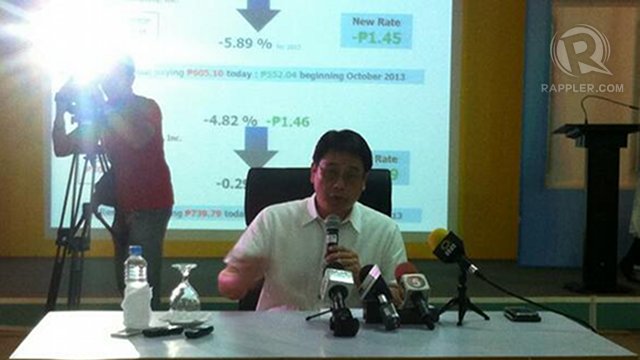SUMMARY
This is AI generated summarization, which may have errors. For context, always refer to the full article.

MANILA, Philippines (3rd UPDATE) – For the first time in 16 years, the water regulator ordered a reduction in water rates in Metro Manila.
In a media briefing on Thursday, September 12, Metropolitan Waterworks Sewerage System (MWSS) acting chief regulator Emmanuel Caparas said rates of water concessionaires Manila Water Co. Inc. and Maynilad Water Services Inc. should go down starting October 2013.
The average basic charge of Manila Water will go down by P1.45 per cubic meter (cu.m.), while Maynilad’s will decline by P1.29. Their current rates are P24.57 and P30.28 per cu.m., respectively.
This means Manila Water customers using 30 cu.m. of water and paying P605.10 per month, will only pay P552.04 next month. Maynilad customers consuming the same volume, on the other hand, will only pay P691.76, down from P739.79.
Caparas said Manila Water’s rate will go down by a total of 29.47% or P7.24 over the next 5 years, while Maynilad’s will fall by 4.82% or P1.46.
The decrease in rates was due to “disallowances for operating and capital expenditures,” he said.
MWSS reviews water rates collected by the distributors using the rate-rebasing model every 5 years. Rate-rebasing allows water firms to recover their expenditures and assures them guaranteed returns. A sticky issue is whether or not the firms should be allowed to pass on their income taxes to consumers.
READ: The price of water: Areas of controversy
READ: MWSS, water firms and taxes: Big trouble, little impact
Caparas said the new rates will take effect 15 days after publication in major broadsheets.
‘Unsubstantiated’ expenses
This is the first time since the privatization of water services in 1997 that rates were ordered reduced. The past two rate-rebasing reviews resulted in huge increases in water rates, noted Caparas.
He said the reduction in rates was due to “unsubstantiated expenses, unliquidated cash advances, infrastructure projects, unjustified variation orders, capitalized interest, among others.”
He said in the case of Maynilad, the rate cut takes into account the Currency Exchange Rate Adjustment (CERA).
“The CERA should have been scrapped long before. We corrected that,” he said in a mix of Filipino and English.
Arbitration case
In separate disclosures to the Philippine Stock Exchange, Manila Water and Maynilad said they will pursue legal options to assert the provisions in their contracts regarding rate-rebasing.
“It is clear that the MWSS arrived at this rate determination after cutting away significant programs for building and maintaining the water and wastewater systems in the east zone. Because of this, our ability to fulfill our service obligations to our customers will be severely compromised and impaired,” Manila Water said.
“Under these circumstances, we feel and believe it is our duty to challenge the MWSS rate determination. As such, we will file the dispute notice, which officially commences the process of arbitration as prescribed in the Concession Agreement,” it added.
Maynilad pointed out the same thing, calling MWSS’ decision “unjustified.”
“We believe that the MWSS’ decision to reduce Maynilad’s water tariff is unjustified. Maynilad will thus initiate arbitration proceedings to dispute the MWSS decision and to settle the tariff rebasing issues promptly to avoid any disruption in its operations to the detriment of its consumers.”
Manila Water is owned by Ayala Corp., while Maynilad is a joint venture between Pangilinan-led Metro Pacific Investments Corp. and Consunji-owned DMCI Holdings Inc.
Both said they will wait for the outcome of the arbitration proceedings.
Caparas said, “That’s part of the process. If they want to [seek arbitration], [they can] go ahead.”
But he said “there is still an opening if they want to discuss a settlement.”
“We’re open to a compromise but it has to be fair and reasonable and does not unduly prejudice the right of consumers.”
Nevertheless, he said, “we’re confident that the work we did will stand arbitration.”
He said the MWSS arrived at the decision after careful and tedious audits of the water firms’ operations. He also said they consulted all stakeholders on the matter.
“The decision of the regulatory office for both concessionaires is contained in two separate resolutions – Manila Water’s is 38 pages and Maynilad’s is 35 pages. The resolutions are lengthy because we believe it is necessary to explain the process as well as the reasons behind the actions taken.”
Manila Water provides water and wastewater services in the east zone of Metro Manila, which covers Makati, Mandaluyong, Pasig, Pateros, San Juan, Taguig, Marikina, and parts of Manila and Quezon City, as well as Rizal province.
It also has projects through subsidiaries in Laguna, Pampanga, Boracay and Cebu.
Maynilad, meanwhile, serves the west zone, which includes the cities of Manila (all but portions of San Andres and Sta. Ana), Quezon City (west of San Juan River, West Avenue, EDSA, Congressional, Mindanao Avenue, the northern part starting from the districts of the Holy Spirit and Batasan Hills), Makati (west of South Super Highway), Caloocan, Pasay, Parañaque, Las Piñas, Muntinlupa, Valenzuela, Navotas and Malabon. It also serves the cities of Cavite, Bacoor and Imus, and the towns of Kawit, Noveleta and Rosario in Cavite province. – Rappler.com
Add a comment
How does this make you feel?
There are no comments yet. Add your comment to start the conversation.